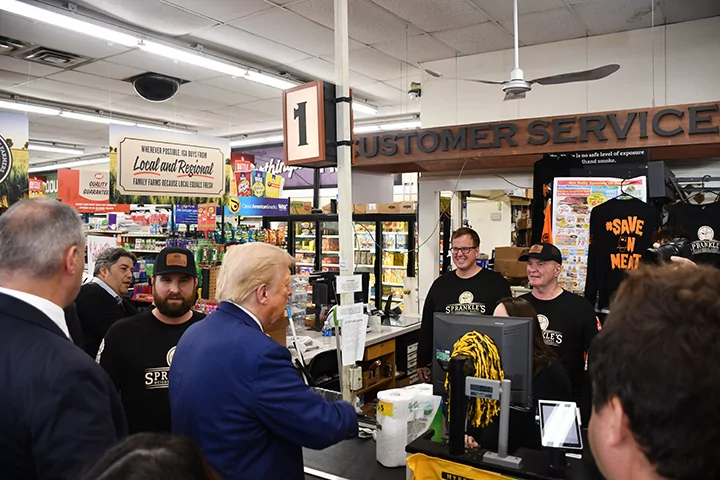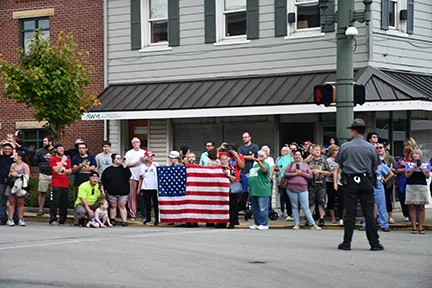KITTANING, Pennsylvania — Jennifer Krantz was in the checkout line at Sprankles grocery store in this Armstrong County city with her three boys, Brayden, Eddie, and Frederick, along with her husband, Bryant, when former President Donald Trump handed the clerk waiting on them a $100 bill.
“Here, it is going to go down a little bit,” Trump told the clerk, to everyone’s astonishment.
“[Krantz’s bill] is going to go down $100,” Trump said.

“Thank you so much,” Krantz said, a little stunned by the help. Afterward, she said her cousin owns the store and that she was just hoping to do two things that day: buy her groceries and catch a glimpse of Trump.
Krantz told me as Trump was walking out of the store that having three active, growing boys means buying a lot of groceries, “and that has put a big strain on our budget, it has been very difficult.”
The visit to Kittanning was the second of three stops the former president made during his visit to Western Pennsylvania on Monday. He traversed over 100 miles throughout Allegheny, Armstrong, Indiana, and Westmoreland counties.
Meandering through mostly back roads, all along the way, Trump’s motorcade was greeted by thousands of people gathering in front of their small towns, suburban bedroom enclaves, or standing in front of their farms with their tractors or cows, waving Terrible Towels, makeshift Trump signs, or official Trump-Vance flags. And even along the jersey barriers of the halted traffic on the Pennsylvania Turnpike, people stood on top of their cars or in front of them to wave.

The former president began the morning in the tiny town of Smithton on a farm surrounded by cornfields and rolling hills for a policy roundtable in a barn with local farmers.
Trump listened intently as third-, fourth-, and fifth-generation farmers shared stories of how they struggle to maintain their calling of providing the country with a food supply. They also told him that many of them are keeping the family farms going because of the royalties from natural gas extracted from their land and their concerns about the Biden-Harris administration’s moratorium on exporting that liquefied natural gas. They told the former president in no uncertain terms about the devastating impact it could have on their livelihood.
From there, Trump went to Sprankles, two expansive counties away, then on to the campus of the Indiana University of Pennsylvania. It was there, ahead of the rally, that I interviewed him, discussing whether he had shifted his position on Nippon Steel’s attempt to purchase U.S. Steel, the long-term impact of nearly four years of an open border, the natural gas industry, his pitch to undecided voters who find his comportment a bridge too far, and why he wants this job again.
The proposed sale of U.S. Steel, a once-robust business that has been part of Western Pennsylvania’s fabric for over 100 years, to the Japanese-owned company has been a political hot potato for months in the state. All of the presidential candidates have been against the sale, as have the United Steelworkers. Yet many locals believe that if some sort of sale does not go through, the remaining U.S. Steel facilities would be vacated.
Trump said that despite all of Nippon’s broad promises, he is still firm on not having a foreign company own an American one, particularly one that may have a hand in future military contracts.
“U.S. Steel was the greatest corporation in the world 70 years ago — it was the biggest, best in the whole world,” Trump said, adding that “we have to bring that greatness back,” but under American ownership.
“We can’t have foreign companies owning our steel companies where they can close it down, in case there’s a war in Asia,” he explained of a military conflict scenario in which a foreign-owned American steel company would call for it to be closed down.
“We would need that steel for our army tanks and our ships and everything else,” Trump said. “We can’t let steel companies be bought by foreign companies. We have China that wants to buy a couple of steel companies. I say, ‘You can’t do that.’ You just can’t do that.”
In keeping with his worldview, in 2018, Trump, as president, blocked transactions involving Chinese companies ByteDance and Singapore’s Broadcom from acquiring American chipmaker Qualcomm.
“You can’t let foreign countries, where who knows what’s going to happen with your relationship with the countries, buy our steel plants,” he said. “… If there’s a war, we have to make our army tanks, we have to make our ships, we have to make our everything. And can you imagine if we had to send away for foreign shipments for steel? So we can’t do it.”
Trump added that “if the union guys aren’t for it, that tells you something.”
“Tell the steelworkers I’m for them,” he said.
As for the discussion he had with the farmers earlier in the day about the moratorium the Biden-Harris administration has placed on liquefied natural gas exports, he said that if Vice President Kamala Harris cannot stand up and say she opposes what her administration is doing, then she remains essentially anti-fracking.
“She will end fracking,” Trump said. “We have to be able to export. Look, our greatest asset in terms of the economics and the economy is, I call it liquid gold, what we have under our feet. We have more than Saudi Arabia. We have more than Russia. We have more than anybody.”
Trump said that, during his administration, the country was energy independent and that “we were soon going to be energy dominant. We have to be able to sell to the entire world, and we have plenty. Think of it. We have more than Saudi Arabia, by far. And that doesn’t even include [the Arctic National Wildlife Refuge], which Biden closed in his first week.”
On the influx of illegal immigrants who have crossed the border, Trump is animated about the impact it has had on the country, not just on the spread of fentanyl traffic coming with it, but how it has affected what he has called our greatest treasure: the life of innocent people.
Under the Biden-Harris administration, for which Harris was in charge of addressing the “root causes” of illegal border crossings, those crossings soared to record levels averaging 2 million per year from 2021 to 2023. They not only landed in border towns, they landed in every state, often overwhelming the resources in New York and Denver, but also landing here in Western Pennsylvania.
That mass settlement has had negative consequences. Over the weekend in Dormont, Pennsylvania, a Pittsburgh suburb, Christian Sluka was killed in a hit-and-run crash by a car that local police said was driven by a reportedly undocumented worker named Saul Rivera-Ramirez.
According to the criminal complaint, Rivera-Ramirez abandoned the car after the accident and walked from the scene with his wife and two children.
Trump said the mass crossings and the long-term effects of illegal immigration are devastating and that these types of tragic consequences happen across the country by the thousands.
“Our country is being destroyed,” he said. “It’s the worst thing. I think it’s the worst. And even our law enforcement has a hard time.”
Trump said his message to voters who are on the fence about him and those who often love his policies but not his comportment is that he gets it, but that there has to be someone out of the mold of traditional politicians to get those policies enacted.
“You need strong people running your government,” he said, pointing to the low numbers of illegal immigrants who crossed the border when he was president, the low inflation rates, and the robust economy. “You need somebody that’s going to make America great again.”
“You need somebody that’s able to get the job done. I get the job done, and I got it done,” he said of his outside-the-box methods.
CLICK HERE TO READ MORE FROM THE WASHINGTON EXAMINER
Despite one failed assassination that grazed his ear in Butler, Pennsylvania, another thwarted by a Secret Service agent in Florida before any shots were fired, and countless lawsuits against him, Trump smiled broadly as he explained why he wants to run again.
“I want us to make America great again,” he said. “We did it once, we’re going to do it again. We’re going to do it. And it’s more important than anything that happens to me, it’s more important than all of the things put together. I really believe we’re going to make this country better than ever before. We have a real shot at doing it.”
